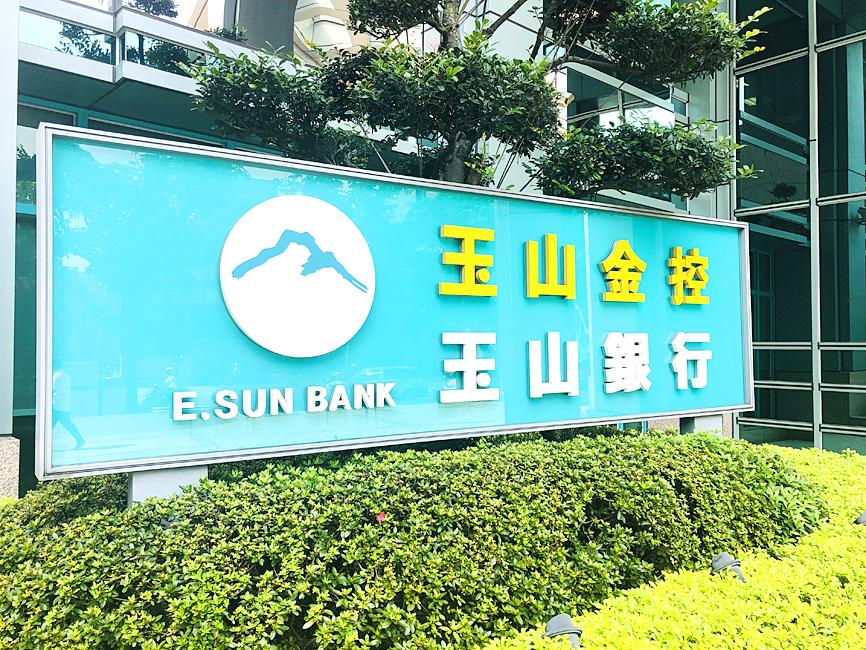The Financial Supervisory Commission (FSC) yesterday fined E.Sun Commercial Bank (玉山銀行) NT$20 million (US$693,698) over a theft scandal and punished the bank’s two top executives.
A customer relationship manager surnamed Pan (潘) at the bank’s branch in Kaohsiung’s Fengshan District (鳳山) stole NT$140 million from 41 clients over the past seven years, the commission said.
Pan secretly transferred the stolen money to accounts belonging to her and her family members by using clients’ debit cards, passwords or documents that were stamped using the clients’ personal stamps between July 2013 and June this year, the commission said.

Photo: Kelson Wang, Taipei Times
The commission suspended Ben Chen (陳炳良), the bank’s deputy director and chief executive of the consumer banking division, and Louis Chang (張綸宇), head of the bank’s wealth management division, for three months for their poor supervision and failure to exercise solid internal controls, Banking Bureau Director-General Sherri Chuang (莊琇媛) said.
The fine is the biggest to be levied on a bank in a single case, as it was not E.Sun’s first offense, Chuang said, adding that the bank was fined NT$12 million in February after another manager stole NT$36 million from clients.
Unlike fines imposed on banks for similar scandals in the past, the commission gave E.Sun’s top executives a heavy punishment as the regulator aims to hold top executives accountable to maintain financial discipline, FSC Chairman Thomas Huang (黃天牧) said.
“People follow the example of their superiors… Our punishment for the two top executives is a warning to all banks,” Huang said.
The FSC spent two months investigating Chen and Chang to ascertain whether they were responsible for the breach, he said.
Chang, who oversees all customer relationship managers, did not set up an effective mechanism to detect irregular transactions between the relationship managers’ accounts and any associated accounts, which gave Pan an opening, Chuang said.
Although the bank has barred relationship managers from withdrawing cash or transferring money on behalf of their clients, the bank’s deposit and transfer division staff still helped Pan conduct the transfers, for which Chen was to blame as he oversees the division, Chuang said.
Besides the two top executives, the bank’s risk management department and audit department also need to improve their practices as they failed to detect the irregular transactions, she said.
E.Sun Bank’s BIS capital ratio would be reduced to 13.75 percent, from 14.02 percent, as the commission thinks that the bank has a higher risk than its current estimate, Chuang said.
E.Sun Bank is also likely to see its scores in the Taiwan Stock Exchange’s corporate governance assessment fall next year, which would likely affect its share price, the commission said.

Zhang Yazhou was sitting in the passenger seat of her Tesla Model 3 when she said she heard her father’s panicked voice: The brakes do not work. Approaching a red light, her father swerved around two cars before plowing into a sport utility vehicle and a sedan, and crashing into a large concrete barrier. Stunned, Zhang gazed at the deflating airbag in front of her. She could never have imagined what was to come: Tesla Inc sued her for defamation for complaining publicly about the vehicles brakes — and won. A Chinese court ordered Zhang to pay more than US$23,000 in

Taiwan Semiconductor Manufacturing Co (TSMC, 台積電) yesterday said that its investment plan in Arizona is going according to schedule, following a local media report claiming that the company is planning to break ground on its third wafer fab in the US in June. In a statement, TSMC said it does not comment on market speculation, but that its investments in Arizona are proceeding well. TSMC is investing more than US$65 billion in Arizona to build three advanced wafer fabs. The first one has started production using the 4-nanometer (nm) process, while the second one would start mass production using the

‘NO DISRUPTION’: A US trade association said that it was ready to work with the US administration to streamline the program’s requirements and achieve shared goals The White House is seeking to renegotiate US CHIPS and Science Act awards and has signaled delays to some upcoming semiconductor disbursements, two sources familiar with the matter told reporters. The people, along with a third source, said that the new US administration is reviewing the projects awarded under the 2022 law, meant to boost US domestic semiconductor output with US$39 billion in subsidies. Washington plans to renegotiate some of the deals after assessing and changing current requirements, the sources said. The extent of the possible changes and how they would affect agreements already finalized was not immediately clear. It was not known

A TAIWAN DEAL: TSMC is in early talks to fully operate Intel’s US semiconductor factories in a deal first raised by Trump officials, but Intel’s interest is uncertain Broadcom Inc has had informal talks with its advisers about making a bid for Intel Corp’s chip-design and marketing business, the Wall Street Journal reported, citing people familiar with the matter. Nothing has been submitted to Intel and Broadcom could decide not to pursue a deal, according to the Journal. Bloomberg News earlier reported that Taiwan Semiconductor Manufacturing Co (TSMC, 台積電) is in early talks for a controlling stake in Intel’s factories at the request of officials at US President Donald Trump’s administration, as the president looks to boost US manufacturing and maintain the country’s leadership in critical technologies. Trump officials raised the